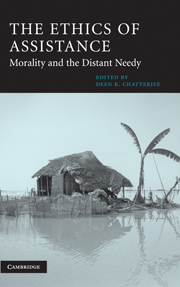Book contents
- Frontmatter
- Contents
- Notes on contributors
- Preface
- 1 Introduction
- PART I THE ETHICS OF DISTANCE
- 2 Outsiders: our obligations to those beyond our borders
- 3 Moral limits on the demands of beneficence?
- 4 The new problem of distance in morality
- 5 Absence and the unfond heart: why people are less giving than they might be
- PART II COMMUNITIES AND OBLIGATIONS
- PART III THE LAW OF PEOPLES
- PART IV RIGHTS, RESPONSIBILITIES AND INSTITUTIONAL REFORMS
- Index
5 - Absence and the unfond heart: why people are less giving than they might be
Published online by Cambridge University Press: 05 June 2012
- Frontmatter
- Contents
- Notes on contributors
- Preface
- 1 Introduction
- PART I THE ETHICS OF DISTANCE
- 2 Outsiders: our obligations to those beyond our borders
- 3 Moral limits on the demands of beneficence?
- 4 The new problem of distance in morality
- 5 Absence and the unfond heart: why people are less giving than they might be
- PART II COMMUNITIES AND OBLIGATIONS
- PART III THE LAW OF PEOPLES
- PART IV RIGHTS, RESPONSIBILITIES AND INSTITUTIONAL REFORMS
- Index
Summary
It was with the publication, in 1972, of Peter Singer's seminal essay “Famine, Affluence, and Morality” that contemporary philosophers begin to think hard about crushing world poverty and the radically unequal distribution of global resources, and about the moral obligations they impose on affluent people. Singer stopped readers short not only because he raised the question as it had not been raised before – certainly not by philosophers – but also because he offered an uncompromising answer. We are obligated to give aid, Singer argued, until giving any more would hurt ourselves more than it would help recipients. (Singer also provided a more moderate conclusion for the faint of heart, although it was clear he thought the uncompromising answer came nearer the truth.) Singer recently restated this view in less abstract terms: “for a household bringing in $50,000 a year, donations to help the world's poor should be as close as possible to $20,000 … a household making $100,000 could cut a yearly check for $70,000. Again, the formula is simple: whatever money you're spending on luxuries, not necessities, should be given away.”
If we judge an argument's power by whether it propels hearers to act on its conclusions, Singer's project would have to be deemed a failure; those possessing the degree of moral commitment his view demands are few and far between. But that lapse has itself contributed to important turns in the philosophical debate.
- Type
- Chapter
- Information
- The Ethics of AssistanceMorality and the Distant Needy, pp. 75 - 98Publisher: Cambridge University PressPrint publication year: 2004
- 13
- Cited by



